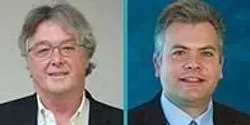Ask the Expert

Zhuoyi Huang, PhD, postdoctoral associate in the laboratory of Dr. Fuli Yu, at the Human Genome Sequencing Center, Baylor College of Medicine, talks to contributing editor Tanuja Koppal, PhD, about the work they have been doing to address the computational challenges associated with analysis of high throughput next-generation sequencing (NGS) data.

Josephine Ferreon is an assistant professor in the Department of Pharmacology, Baylor College of Medicine in Houston, Texas. Her structural biology group characterizes various intrinsically disordered proteins (IDPs), important in stem cell biology and neurodegenerative diseases, using standard and state-of-the-art biochemical/biophysical techniques such as NMR and single molecule fluorescence spectroscopy.

Serge Cremers, Pharm. D., PhD, is an associate professor at Columbia University Medical Center and an attending clinical chemist at New York Presbyterian Hospital. He is the director of the Clinical Pharmacology and Toxicology Laboratory at Columbia University Medical Center and the director of the Biomarkers Core Laboratory of the Irving Institute for Clinical and Translational Research, which is home to Columbia University’s Clinical and Translational Science Award (CTSA) and the largest mass spectrometry facility at Columbia University, focusing on targeted metabolomics and the measurement of drugs. Dr Cremers’ areas of expertise are bio-analytical chemistry, translational and clinical pharmacology, therapeutic drug monitoring, as well as clinical chemistry of metabolic bone diseases. He conducts research in all of these areas and has published over 90 papers.

Michael Rummel has held the position of chief operating officer at InSource Diagnostics, an independent laboratory that focuses on medication monitoring and compliance testing, for several years. Since graduating from the University of Wisconsin-Madison in 2005, Michael has pursued a career working in the analytical and clinical sciences. He has expertise in analytical chemistry assay development specifically with liquid chromatography/mass spectrometry, assay optimization, and sample preparation optimization and development.

Dieter C. Gruenert, PhD, (bottom left) is a professor of otolaryngology—head and neck surgery at the University of California, San Francisco (UCSF) and pediatrics at the University of Vermont (UVM). He has a PhD in biophysics from the University of California at Berkeley and was a postdoctoral fellow in carcinogenesis at L’Institut Suisse de Recherche Expérimentale sur le Cancer in Lausanne. He was co- director of the Gene Therapy Core Center at UCSF, director of the Division of Human Molecular Genetics at UVM, and head of the Stem Cell Research Program at California Pacific Medical Center. His research focuses on development of gene editing and cell-based therapies for inherited diseases and cancer. He has developed novel diagnostic and oligonucleotide-based therapeutic strategies to ameliorate disease pathology.

Dr. Donald Sakaguchi, professor of genetics, development and cell biology at Iowa State University, talks to contributing editor Dr. Tanuja Koppal about the time and cost savings generated in his lab due to a recent investment in a high-content screening (HCS) system. While his research group can now set up more experiments to look at different cell types and conditions, they also spend more time carefully designing the experiments and optimizing the conditions and later analyzing the vast amounts of data generated from each experiment.

Douglas Kiehl is a principal research scientist at Eli Lilly & Company, and is currently leader for the Spectroscopy & Raw Materials team. His group performs characterization and structural elucidation of impurities, related substances, and contaminants as well as testing and qualification of process raw materials through development and commercialization. Additionally, his team leads Lilly’s technical strategy for evaluating extractables and leachables associated with pharmaceutically relevant materials.

Harm Moes is technical support engineer at SGS in the Netherlands. Mr. Moes has 13 years of experience in analytical instrumentation and held several technical positions with an analytical instrument supplier before joining SGS. At SGS, he provides technical support to the SGS oil, gas, and chemical labs in the Netherlands. That includes implementation and validation of new instrumentation, techniques, and methods, and instruction and training of laboratory personnel.

Dr. Nathaniel Hentz is assistant director of the analytical lab at the Golden LEAF Biomanufacturing Training and Education Center (BTEC), where he develops bioanalytical assays in support of the various biomanufacturing processes taught at BTEC. Since 2008, Dr. Hentz has been responsible for developing and teaching undergraduate and graduate courses, industry short courses, and government (FDA and BARDA) training courses, with a focus on assay development and validation, quality control, and liquid-handling performance.












